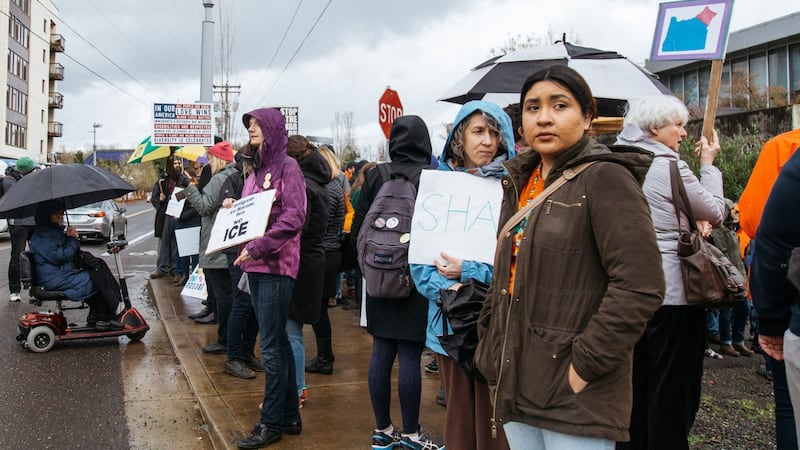The ACLU of Oregon is filing a new lawsuit in federal court Feb. 7 against the U.S. Department of Homeland Security and Immigration and Customs Enforcement, seeking information about the agency's secretive practice of making arrests at Oregon courthouses.
The suit follows ICE's resumption of the controversial tactic of apprehending suspected undocumented immigrants as they leave court.
On Jan. 22, plainclothes ICE agents followed a man as he left the Washington County Courthouse in Hillsboro with an ACLU legal observer. The man had been in court for a hearing on misdemeanor drug and theft charges.
The ICE agents waited until the legal observer left him on the platform of a nearby MAX station, the ACLU says, and then arrested him. Such arrests have spread fear in immigrant communities. After public outcry, ICE appeared to temporarily halt the practice late last year.
"People don't feel safe going to court," says Unite Oregon lead organizer Yanely Rivas. "Their tactics are cruel and they need to stop."
The ACLU's lawsuit aims to figure out ICE's rationale for its enforcement actions.
"ICE is ignoring numerous requests from the court that they not do this and also ignoring advocacy organizations that are on the ground in these communities," says Mat dos Santos, legal director for the ACLU of Oregon.
The ACLU has tracked 11 arrests by ICE agents in or near Oregon courthouses over the past year. But the U.S. Department of Homeland Security has provided little information about ICE policies regarding these arrests despite widespread public alarm.
In October, the ACLU of Oregon filed a Freedom of Information Act request asking for records that would shed light on ICE's tactics. The agency acknowledged the organization's request and, after prodding from U.S. Rep. Suzanne Bonamici (D-Ore.), whose district includes Washington County, granted the group's request for expedited processing.
More than three months later, ICE has failed to release any responsive records.
"They continue to operate in this sort of secret mode without giving the public information," dos Santos says. "We don't want our own secret immigration police, and that's essentially what we have right now."

ICE agents have been targeting Oregon courthouses since President Donald Trump expanded immigration enforcement last year.
The Jan. 22 arrest in Hillsboro follows previous controversial enforcement actions.
On Sept. 18, agents mistakenly questioned a Washington County employee and U.S. citizen, Isidro Andrade-Tafolla, at the courthouse. About a month later, ICE agents entered a downtown Portland home under renovation, allegedly without a warrant, and arrested Carlos Bolanos, who was working there. Bolanos was later released.
U.S. lawmakers from Oregon have demanded that ICE leadership answer questions about those two incidents. The agency says its agents followed federal law and agency policies.
But WW found ICE agents may have violated their own policies in Portland at least once last spring when they arrested a 19-year-old man at a bus stop in front of a hospital. That arrest remained secret for nearly seven months because ICE rarely releases information about arrests in which the person detained faces no criminal charges.
In response to questions about the January arrest, which has never been previously reported, ICE spokeswoman Lori Haley cited the agency's new directive on courthouse tactics.
"Civil immigration enforcement actions taken inside courthouses can reduce safety risks to the public, targeted alien(s), and ICE officers and agents," deputy director Thomas Homan wrote in a directive issued Jan. 10.
The directive creates policy where there had been no clear guidelines, but leaves agents wide latitude to determine acceptable enforcement actions. It says immigration officials "should generally avoid" making arrests at civil court proceedings, but gives agents discretion to make enforcement decisions on a case-by-case basis.
The Jan. 22 arrest, coupled with changes to ICE policies, may signal the agency is ramping up its enforcement efforts.
"We have heard recently—since the promulgation of this new policy—that ICE enforcement actions at courthouses appear to be starting again," dos Santos says.
